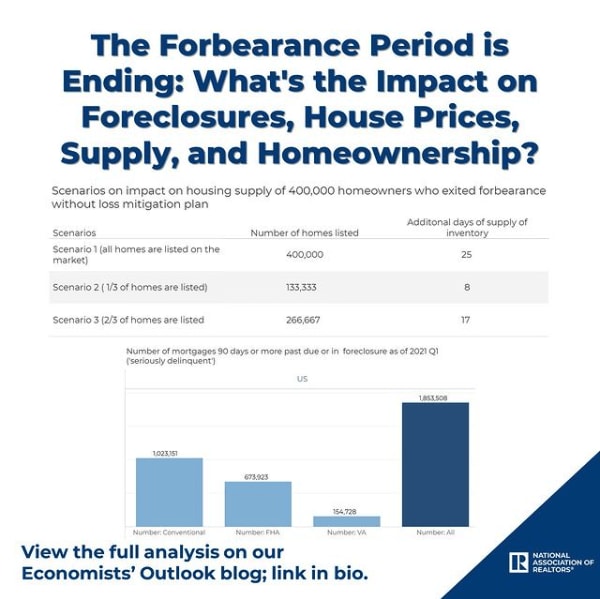There has been a lot of discussion as to what will happen once the 2.3 million households currently in forbearance no longer have the protection of the program. Some assume there could potentially be millions of foreclosures ready to hit the market. However, there are four reasons that won’t happen.
1. Almost 50% Leave Forbearance Already Caught Up on Payments
According to the Mortgage Bankers Association (MBA), datathrough March 28 show that 48.9% of homeowners who have already left the program were current on their mortgage payments when they exited.
- 26.6% made their monthly payments during their forbearance period
- 14.7% brought past due payments current
- 7.6% paid off their loan in full
This doesn’t mean that the over two million still in the plan will exit exactly the same way. It does, however, give us some insight into the possibilities.
2. The Banks Don’t Want the Houses Back
Banks have learned lessons from the crash of 2008. Lending institutions don’t want the headaches of managing foreclosed properties. This time, they’re working with homeowners to help them stay in their homes.
As an example, about 50% of all mortgages are backed by the Federal Housing Finance Agency (FHFA). In 2008, the FHFA offered 208,000 homeowners some form of Home Retention Action, which are options offered to a borrower who has the financial ability to enter a workout option and wants to stay in their home. Home retention options include temporary forbearances, repayment plans, loan modifications, or partial loan deferrals. These helped delinquent borrowers stay in their homes. Over the past year, the FHFA has offered that same protection to over one million homeowners.
Today, almost all lending institutions are working with their borrowers. The report from the MBA reveals that of those homeowners who have left forbearance,
- 35.5% have worked out a repayment plan with their lender
- 26.5% were granted a loan deferral where a borrower does not have to pay the lender interest or principal on a loan for an agreed-to period of time
- 9% were given a loan modification
3. There Is No Political Will to Foreclose on These Households
The government also seems determined not to let individuals or families lose their homes. Bloomberg recently reported:
“Mortgage companies could face penalties if they don’t take steps to prevent a deluge of foreclosures that threatens to hit the housing market later this year, a U.S. regulator said. The Consumer Financial Protection Bureau (CFPB) warning is tied to forbearance relief that’s allowed millions of borrowers to delay their mortgage payments due to the pandemic…mortgage servicers should start reaching out to affected homeowners now to advise them on ways they can modify their loans.”
The CFPB is proposing a new set of guidelines to ensure people will be able to retain their homes. Here are the major points in the proposal:
- The proposed rule would provide a special pre-foreclosure review period that would generally prohibit servicers from starting foreclosure until after December 31, 2021.
- The proposed rule would permit servicers to offer certain streamlined loan modification options to borrowers with COVID-19-related hardships based on the evaluation of an incomplete application.
- The proposal rule wants temporary changes to certain required servicer communications to make sure borrowers receive key information about their options at the appropriate time.
A final decision is yet to be made, and some do questionwhether the CFPB has the power to delay foreclosures. The entire report can be found here: Protections for Borrowers Affected by the COVID-19 Emergency Under the Real Estate Settlement Procedures Act (RESPA), Regulation X.
4. If All Else Fails, Homeowners Will Sell Their Homes Before a Foreclosure
Homeowners have record levels of equity today. According to the latest CoreLogic Home Equity Report, the average equity of mortgaged homes is currently $204,000. In addition, 38% of homes do not have a mortgage, so the level of equity available to today’s homeowners is significant.
Just like the banks, homeowners learned a lesson from the housing crash too.
“In the same way that grandparents and great grandparents were shaped by the Great Depression, much of the public today remembers the 2006 mortgage meltdown and the foreclosures, unemployment, and bank failures it created. No one with any sense wants to repeat that experience…and it may explain why so much real estate equity remains mortgage-free.”
What does that mean to the forbearance situation? According to Black Knight:
“Just one in ten homeowners in forbearance has less than 10% equity in their home, typically the minimum necessary to be able to sell through traditional real estate channels to avoid foreclosure.”
Bottom Line
The reports of massive foreclosures about to come to the market are highly exaggerated. As Ivy Zelman, Chief Executive Officer of Zelman & Associates with roughly 30 years of experience covering housing and housing-related industries, recently proclaimed:
“The likelihood of us having a foreclosure crisis again is about zero percent.”
As the foreclosure moratorium for federally-guaranteed and GSE-backed mortgages is about to end on June 30 (unless extended), there are still 2.7 million homeowners who are not caught up on their mortgage payment and 1.8 million loans that are seriously delinquent. How will this impact the housing market and homeownership?
Our analysis shows the impact on housing prices is likely to be minimal, with 77% of loans in forbearance having a debt repayment plan and with a housing shortage of 5 million single-family homes.
However, the foreclosures will likely widen the already alarming homeownership gap among income groups and racial groups, with low income and minority groups twice as likely to face foreclosure than higher income and non-minority groups and homeowners of FHA-insured loans three times as likely to face foreclosure.
